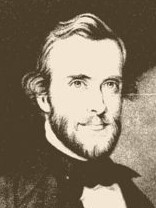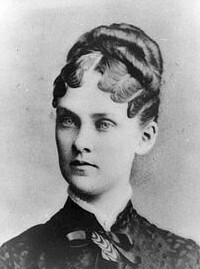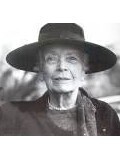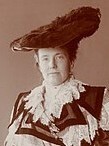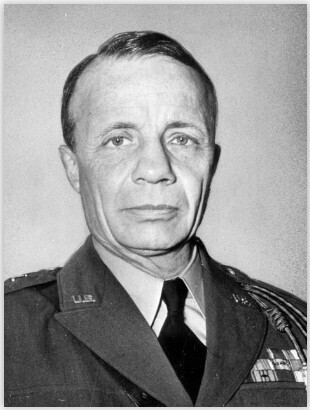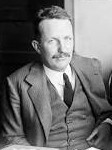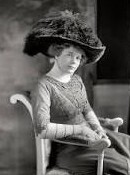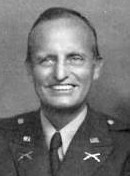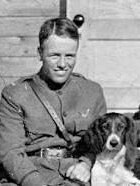Families Klein, Ree, de Breed en de Vries van Terschelling » Theodore Roosevelt (1858-1919)
Données personnelles Theodore Roosevelt
- Il est né le 27 octobre 1858 dans New York City, New York.
- Profession: President der U.S.A..
- Récensement en l'an 1860, Third Division 18th Ward, New York, New York, Verenigde Staten.
- Récensement en l'an 1900, Oyster Bay Township, Election District 5, Nassau, New York, Verenigde Staten.
- Il est décédé le 6 janvier 1919 dans Sagamore Hill, Oyster Bay, New York, Verenigde Staten, il avait 60 ans.
- Il est enterré janvier 1919 dans Young's Memorial Cemetery, Oyster Bay, Nassau County, New York, United States.
- Un enfant de Theodore Roosevelt et Martha Bulloch
Famille de Theodore Roosevelt
(1) Il est marié avec Alice Hathaway Lee.
Ils se sont mariés le 27 octobre 1880 à Brookline, Massachusetts, il avait 22 ans.
Enfant(s):
- Alice Lee Roosevelt 1884-1980
(2) Il est marié avec Edith Kermit Carow.
Ils se sont mariés à London, England.
Enfant(s):
- Kermit B. Roosevelt 1889-1943
- Ethel Carow Roosevelt 1891-1977
- Archibald Bulloch Roosevelt 1894-1979
- Quentin Roosevelt 1897-1918
Notes par Theodore Roosevelt
26th United States President, 25th United States Vice President, 33rd New York Governor, Spanish American War Medal of Honor Recipient, Nobel Peace Prize Recipient. His father Theodore Roosevelt, Sr. was a merchant. Theodore Jr. was born into a family which taught him to respect men and women as equals regardless of religion, race or nationality. Raised in New York City, his family spent the summers in the country and during this period, he developed a love for the outdoors, which remained with him for life. Roosevelt was a sickly child who suffered from extreme asthma, which resulted in him being home schooled for the majority of his youth. While vacationing with his family in Europe, he developed a keen interest in animals and birds and upon his return home, he chose to pursue a career in Natural Science. When the realization of having difficulty finding an occupation in this field entered his mind, he switched to studying law and attended Harvard University, but departed prior to earning his degree. For recreation, he enjoyed wrestling and boxing. Roosevelt was twenty- three years old when he entered the political arena as a New York State Assemblyman. During this period, he learned the harsh reality of the game of politics, which included party-controlled bosses and easily influenced public servants. Roosevelt made a commitment that his decisions and priorities would always be for the better of the people he was elected to serve. This did not always sit well with his political mates. In 1884, he left politics for a five-year period when his desire to work in the great outdoors engulfed him. He became owner of a ranch out West and advanced his abilities as a big game hunter. He returned to the East and was appointed Civil Service Commissioner under President Benjamin Harrison. From 1895 to 1897, he served as Police Commissioner of New York City. From 1897 to 1898, he served as Assistant Secretary of the United States Navy. After the Spanish-American War started, Roosevelt, who had served with the New York National Guard, volunteered and became commander of the First United States Volunteer Cavalry Regiment. Known more commonly as “The Rough Riders,” his unit of men headed for Cuba to aid in that nation's fight for independence from Spain. . He earned a place in history, when on July 1, 1898, he led the charge up San Juan Hill against the Spaniards. Roosevelt rose to the rank of colonel and returned home a national hero. He was posthumously award the Medal of Honor in 2001 for his conspicuous valor during this war. He won a close election for Governor of New York serving 1898 to 1900. During his governorship, he appointed a Committee on Canals, which led to the formation of the Barge and Canal System of New York. Great changes including the widening of the Erie Canal led to its vitality. Roosevelt was nominated for vice president and after a six-month period at that capacity, he succeeded William McKinley following his assassination. Roosevelt holds the distinction of being the youngest individual to enter the non-elected presidency, when he was sworn in at the age of forty-two on September 14, 1901. Among Roosevelt’s landmark accomplishments include the construction of the Panama Canal, which was completed in 1914, his mediation for peace to end the Russo-Japanese War in 1905. For this accomplishment, he was recipient of the Nobel Peace Prize in 1906 and his fight against “big business” corruption. During his tenure, the Antitrust Policy was established which led to suits against Standard Oil, railroad companies, tobacco companies and the beef industry. For the later, the Meat Inspection Act, Pure Food and Drug Act were instituted in 1906. In what was a personal passion of Roosevelt’s Conservation of the National Forests and the nations waterways expanded. Dams and irrigation systems in the West were devised and constructed. Wildlife refuges were founded. Roosevelt became known as “The Great Conservationist”. Roosevelt did not seek a second term of his own in 1908. During his retirement, he went on a one year long African safari from 1909 to 1910. Upon his return home, he became distraught over his successor President Taft’s conservative direction and chose to run for president. He failed to secure the Republican Nomination from Taft but remained active in the campaign, after forming the Progressive Party, also known as the “Bull Moose” party. Roosevelt’s popularity caused a split in the Republican Party, which led to Taft being defeated for reelection by Woodrow Wilson. While campaigning on October 14, 1912, Roosevelt was shot in the chest by a would-be assassin. In a show of strength, or perhaps foolishness, he delivered an hour-long speech immediately following the shooting and later went to the hospital to receive treatment. He would make a full recovery even though the bullet was not removed. After the United States entered World War I, or The Great War, Roosevelt volunteered to organize and lead a unit, however President Wilson rejected the request. Towards his final years, he suffered from the recurrence of malaria, which he had contracted in Brazil, and rheumatism. His death was the result of a coronary embolism while he slept. Roosevelt’s final statement was his editorial criticizing President Wilson for his efforts to propose a League of Nations. Along with George Washington, Thomas Jefferson and Abraham Lincoln, the likeness of Roosevelt’s face was sculpted on Mount Rushmore in South Dakota. Roosevelt is regarded by many as one of the greatest presidents in United States History.
Barre chronologique Theodore Roosevelt
 grand-parents
grand-parents
 parents
parents
 frères/soeurs
frères/soeurs
 enfants
enfants
Ancêtres (et descendants) de Theodore Roosevelt
Theodore Roosevelt 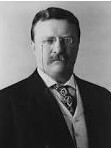 | ||||||||||||||||||||||||||||||||||||||
(1) 1880 | ||||||||||||||||||||||||||||||||||||||
Alice Hathaway Lee | ||||||||||||||||||||||||||||||||||||||
(2) | ||||||||||||||||||||||||||||||||||||||
Edith Kermit Carow | ||||||||||||||||||||||||||||||||||||||
Les données affichées n'ont aucune source.
Des liens dans d'autres publications
On rencontre cette personne aussi dans la publication:Événements historiques
Jour de naissance 27 octobre 1858
- La température le 27 octobre 1858 était d'environ 4,2 °C. La pression atmosphérique était de 77 cm de mercure. Le taux d'humidité relative était de 100%. Source: KNMI
- Cette page est uniquement disponible en néerlandais.De Republiek der Verenigde Nederlanden werd in 1794-1795 door de Fransen veroverd onder leiding van bevelhebber Charles Pichegru (geholpen door de Nederlander Herman Willem Daendels); de verovering werd vergemakkelijkt door het dichtvriezen van de Waterlinie; Willem V moest op 18 januari 1795 uitwijken naar Engeland (en van daaruit in 1801 naar Duitsland); de patriotten namen de macht over van de aristocratische regenten en proclameerden de Bataafsche Republiek; op 16 mei 1795 werd het Haags Verdrag gesloten, waarmee ons land een vazalstaat werd van Frankrijk; in 3.1796 kwam er een Nationale Vergadering; in 1798 pleegde Daendels een staatsgreep, die de unitarissen aan de macht bracht; er kwam een nieuwe grondwet, die een Vertegenwoordigend Lichaam (met een Eerste en Tweede Kamer) instelde en als regering een Directoire; in 1799 sloeg Daendels bij Castricum een Brits-Russische invasie af; in 1801 kwam er een nieuwe grondwet; bij de Vrede van Amiens (1802) kreeg ons land van Engeland zijn koloniën terug (behalve Ceylon); na de grondwetswijziging van 1805 kwam er een raadpensionaris als eenhoofdig gezag, namelijk Rutger Jan Schimmelpenninck (van 31 oktober 1761 tot 25 maart 1825).
- Du 1 juillet 1856 au 18 mars 1858 il y avait aux Pays-Bas le cabinet Van der Brugghen avec comme premier ministre Mr. J.L.L. van der Brugghen (protestant).
- Du 18 mars 1858 au 23 février 1860 il y avait en Hollande le gouvernement Rochussen - Van Bosse avec comme premiers ministres J.J. Rochussen (conservatief-liberaal) et Mr. P.P. van Bosse (liberaal).
- En l'an 1858: Source: Wikipedia
- La population des Pays-Bas était d'environ 3,3 millions d'habitants.
- 14 janvier » attentat contre Napoléon III.
- 21 janvier » Benito Juárez devient président du Mexique.
- 1 février » le juriste Raymond-Théodore Troplong, président du Sénat depuis 1852, est nommé par un décret membre du Conseil privé de l'empereur Napoléon III.
- 27 février » promulgation de la loi de sûreté générale du Second Empire de Napoléon III.
- 26 juin » signature du traité de Tianjin, consacrant la victoire occidentale lors de la seconde guerre de l'opium.
- 29 juillet » signature du Traité Harris.
Jour du mariage 27 octobre 1880
- La température le 27 octobre 1880 était d'environ 3,9 °C. Il y avait 7 mm de précipitation. La pression du vent était de 1 kgf/m2 et provenait en majeure partie du nord-est. La pression atmosphérique était de 75 cm de mercure. Le taux d'humidité relative était de 97%. Source: KNMI
- Du 20 août 1879 au 23 avril 1883 il y avait aux Pays-Bas le cabinet Van Lijnden van Sandenburg avec comme premier ministre Mr. C.Th. baron Van Lijnden van Sandenburg (conservatief-AR).
- En l'an 1880: Source: Wikipedia
- La population des Pays-Bas était d'environ 4,0 millions d'habitants.
- 10 mars » à New York, l'Armée du salut fondée à Londres en 1865, commence ses activités en terre d'Amérique, donnant à l'organisme son caractère international. Au fil des ans, elle étendra son champ d'action dans une centaine de pays.
- 11 mai » tragédie du marécage de Mussel(en), en Californie. Au cours d'un affrontement armé, des policiers agissant sous les ordres de la Southern Pacific Railroad tuent sept habitants qui refusent de céder leurs terres à la compagnie pour la construction d'une voie ferrée.
- 7 juin » victoire chilienne sur le Pérou, à la bataille d'Arica, pendant la guerre du Pacifique.
- 14 juillet » apparition de la devise Liberté, Égalité, Fraternité, sur les frontons de toutes les institutions publiques françaises.
- 8 août » ouverture à Boma, par des missionnaires catholiques, de la première école de la République démocratique du Congo, comptant dès le départ une vingtaine d’enfants.
- 23 septembre » entrée en fonction du Gouvernement Jules Ferry (1).
Jour du décès 6 janvier 1919
- La température au 6 janvier 1919 était entre 2,9 et 6,7 °C et était d'une moyenne de 5,0 °C. Il y avait 0.7 heures de soleil (9%). La force moyenne du vent était de 5 Bft (vent assez fort) et venait principalement du sud. Source: KNMI
- Du 9 septembre 1918 au 18 septembre 1922 il y avait aux Pays-Bas le cabinet Ruys de Beerenbrouck I avec comme premier ministre Jonkheer mr. Ch.J.M. Ruys de Beerenbrouck (RKSP).
- En l'an 1919: Source: Wikipedia
- La population des Pays-Bas était d'environ 6,7 millions d'habitants.
- 4 janvier » l'Armée rouge occupe la ville de Riga en Lettonie.
- 5 janvier » |début de la révolte spartakiste de Berlin.
- 7 janvier » début de la semaine tragique à Buenos Aires.
- 15 janvier » |le pianiste et compositeur Ignacy Paderewski devient le premier chef de gouvernement de la nouvelle République polonaise.
- 13 avril » massacre d'Amritsar. Les soldats britanniques tuent plusieurs centaines d'Indiens lors d'un rassemblement politique pacifique.
- 19 août » indépendance de l’Afghanistan.
Même jour de naissance/décès
- 1811 » Isaac Merrit Singer, inventeur et industriel américain († 23 juillet 1875).
- 1841 » Guillaume-Marie-Joseph Labouré, prélat français († 21 avril 1906).
- 1846 » Paul LaRocque, évêque catholique québécois († 15 août 1926).
- 1858 » Theodore Roosevelt, homme politique et militaire américain, 26 président des États-Unis de 1901 à 1909 († 6 janvier 1919).
- 1894 » Albert Préjean, acteur français († 1 novembre 1979).
- 1895 » Yvonne Jean-Haffen, artiste peintre, dessinatrice, graveuse et céramiste française († 24 novembre 1993).
- 1918 » Georg Cantor, mathématicien allemand (° 3 mars 1845).
- 1919 » Max Heindel (Carl Louis von Grasshoff, dit), astrologue danois (° 23 juillet 1865).
- 1937 » Frère André (Alfred Bessette, dit), religieux canadien, saint de l'Église catholique (° 9 août 1845).
- 1938 » Henri Ner dit Han Ryner, philosophe anarchiste individualiste, pacifiste, journaliste et écrivain français (° 7 décembre 1861).
- 1942 » Emma Calvé (Rosa Noémie Emma Calvet, dite), cantatrice française (° 15 août 1858).
- 1949 » Victor Fleming, réalisateur américain (° 23 février 1883).
Sur le nom de famille Roosevelt
- Afficher les informations que Genealogie Online a concernant le patronyme Roosevelt.
- Afficher des informations sur Roosevelt sur le site Archives Ouvertes.
- Trouvez dans le registre Wie (onder)zoekt wie? qui recherche le nom de famille Roosevelt.
Marthan Klein, "Families Klein, Ree, de Breed en de Vries van Terschelling", base de données, Généalogie Online (https://www.genealogieonline.nl/families-klein-ree-ea/I133745.php : consultée 12 juin 2024), "Theodore Roosevelt (1858-1919)".
